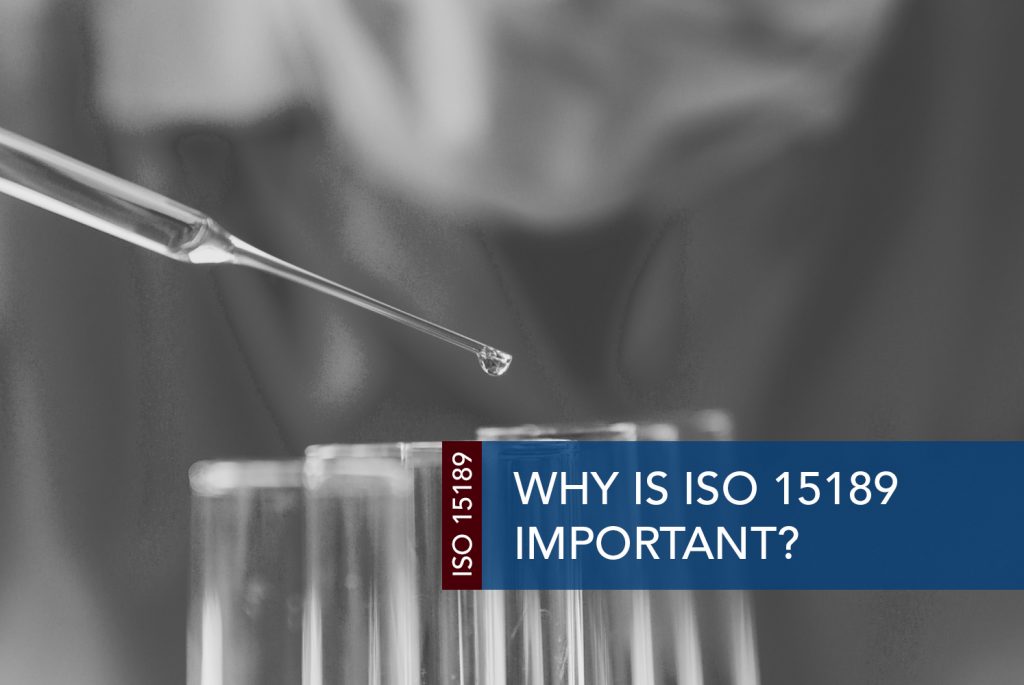
Why is ISO 15189 important?
March 17th, 2021 By AmywrightCompetence in any field is crucial, but it’s even more pertinent in the medical sphere where the patient’s system is compromised by disease or injury. ISO 15189 is a mark of confidence awarded to medical laboratories – an accreditation that proves you are dedicated to delivering a proficient and quality service across all aspects of your operation.
With 300,000 tests performed every working day of the year and around 95% of clinical pathways relying on patients having access to pathology services, it’s clear that medical laboratories sit at the heart of a fully functional modern society. Becoming ISO 15189 accredited will verify three key components of a laboratory: your integrity, impartiality, and capabilities. Here’s a little bit more about this crucial ISO standard.
What is ISO 15189?
ISO 15189 is an international standard for medical laboratories. Laboratory accreditation helps labs develop quality management systems, assess their competence, and ensures they are functioning in line with industry and legal standards.
As part of your ISO 15189 accreditation process, you will create a document that explains how your laboratory can work to conform to each requirement to a high standard of quality. This handy document will provide each member of your team with instructions for performing the tasks to an ISO accredited standard.
Who needs ISO 15189?
Laboratory testing is incredibly important in the delivery of information-based healthcare outcomes – this is incredibly important in a world where decisions need to be driven by facts, science, and data. Any medical laboratory that wants to deliver clinically relevant results that meet the highest ethical standards should become ISO 15189 accredited.
Is ISO 15189 mandatory?
ISO 15189 accreditation is not mandatory in every jurisdiction, but it’s worth checking your local regulations. Nevertheless, the importance of laboratory accreditation should never be overlooked, especially when you are dealing with public health.
As part of your accreditation process, you will get your organisation up to date with all the complex legal requirements that a medical laboratory must adhere to. With the ISO’s culture of continuous improvement, any changes to law or regulation will be implemented as part of your ongoing commitment to best practice.
What are the benefits of ISO 15189?
There are many reasons why ISO 15189 is important – here are some of the benefits it offers to medical laboratories:
Risk reduction
When you structure your operation around best practice, your systems will be more rigorous. Planning for and identifying any potential risks will help massively reduce them – especially in laboratories that deal with sensitive information, complicated equipment and matters pertaining to people’s health.
Cost saving
By assuring results are technically valid, your laboratory will save costs associated with retesting. There will also be other cost saving measures implemented across the standard as your efficiency increases.
Improve team morale
The standard works to reduce staff mistakes and other preventable errors. Your staff motivation won’t only be improved by their demonstration of better performance, but also by you recognizing and promoting your staff’s technical competence.
Legally compliant
By implementing legislation and industry standards into your medical laboratory, ISO 15189 assures that your clinical services are safe, reliable, and of good value. This conveys trust to stakeholders and decision makers who recognise and appreciate the commitment. Legal challenges will be less likely and, if they do occur, you can ensure the framework will support you.
Continual improvement
Best practices won’t start and end with your ISO 15189 accreditation: through integrating this framework into the core of what you do, you will develop additional programmes over time. The framework acts as a tool for measuring quality improvements and continually supporting consistency.
Globally recognised
Being a globally recognised standard not only has reputational benefits. For ISO 15189, global recognition is particularly pertinent. A series of Multilateral Mutual Recognition Arrangements within the International Laboratory Accreditation Cooperation (ILAC) means that laboratories accredited to ISO 15189 will have their certificates and test reports accepted in over 80 countries around the world. This way, your work can benefit medical health not just in your country, but all over the globe.

Contact Us
For a free quotation or remote presentation by an ISO specialist, contact us today.
IMSM Ltd Head Office
The Gig House
Oxford Street
Malmesbury
Wiltshire
SN16 9AX